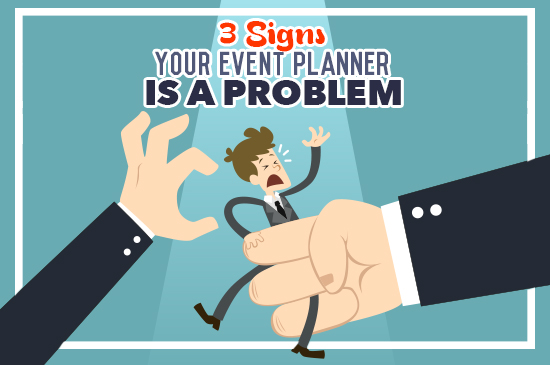Skift Take
Is your event planner a problem? This article reveals the red flags to look out for when hiring an event planner.
It’s hard to find an event planner you trust with your events. No matter what the size, budget or venue, you need an exceptional event planner to implement and organize all of the details for the event. Good event planners have their go-to checklists they abide by for every event they plan, and review all areas of the event several times before the big day. For other planners, you will find they have picked up bad habits along the way, which can ultimately lead to your event going down hill fast, and having to let them go. Below are a few signs to look out for when hiring an event planner that can be red warning flags.

The Three Signs of an Event Planner Problem
1. Finding the Easy Way Out
It’s never a good idea to take shortcuts as an event planner. Events are very detail-oriented, and sometimes complicated to get up and running. Taking a shortcut or finding the easy way out of any area of an event is a big No-No.
A few areas you may see event planners taking short cuts consist of the overall budget, cheaper vendors, or technology cuts. Events cost a lot of money, but cutting back on areas that count for almost 90% of the event to go well is not a great idea.
You want to make sure you have the right vendors, i.e. right extension of your events team as a planner to trust and ensure they will do an awesome job. The same goes for technology cuts. If you’re finding as the event planner that the overall cost for technology at the event (i.e. WiFi, charging stations, etc.) equals out to a bigger number than expected, this is a red flag. Most event planners have a great idea guesstimating how much technology will cost for any event, and have done their homework when it comes to how much to set aside in the budget for anything tech related. This is definitely NOT an area you want your event attendees to be upset about if the WiFi is spotty or not available at times – a crisis or panic may occur. Be on the lookout for any of these issues when planning your event. If you see your event planner going with a cheaper vendor on an important area of the event, be sure to speak up and question why they chose that route.
2. Going Old School
All event attendees expect a fast-paced check in at registration at events today. If you attend an event and are still having to fill out information for a badge via printed paperwork, there’s another red flag! Good event planners know exactly how to make registration a smooth process for attendees. If you have to wait in long lines, or check in manually you’re not working with the right planner. Creating an old school set up for any area of your event can be a big pain for all of the attendees, and it doesn’t come across as attractive or coordinated at all. Make sure you hire the right event planner who has unique registration ideas, and will make sure everyone attending is happy and greeted with an easy peasy process at the door.
Registration is the first touch point event attendees have, so any planner should make sure this is a delightful process, not one that has people buzzing about the awful check in, and guessing how the remainder of the event will roll out.
If you notice your planner is not on top of the registration process, and going the old school route, i.e. manual check-in, or seeing long lines with not enough staff to man this area, be sure to question the planner on ways they can alter the set up to get things rolling.
3. Micromanaging 24/7
The last thing anyone attending an event wants to see is an event planner micromanaging every little detail and person at the event. Good event planners are very organized, have goals in mind to accomplish, have a positive attitude all the time, but most importantly know when to sit back and relax. It’s a bad look for planners who need to be ‘in the know” every second of the event. It’s ok to micro manager to a small extent, it’s part of the job to make sure every area is running smoothly and attendees are happy, but know you can trust the vendors you hired to do their job without you butting into every detail they provide the event.
The overall job of the event planner is to plan, implement, and be there as a liaison on the day of as the go-to person for any questions vendors or attendees have – not try to do what you hired vendors to do. You can’t be everywhere during an event, so make sure you’re there for the right people at the right time.
In Conclusion
Event planning is not cut out for everyone. If you start seeing any of the above red flags, or other warning signs such as not being personable, or they lack energy and passion to plan the event and see it through, then you may want to have a chat with your planner and see why he or she may be making these decisions. An event is a big deal to all involved in the planning process, so having the best manager on staff is key to a successful event from beginning to end.





